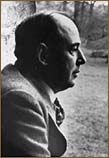Popular Theology

by Ann-Marie Imbornoni |
 |
In 1933 Lewis published his first major work, The Pilgrim's Regress, an allegorical telling of his own journey to belief in Christ. Along the way, the hero of the book encounters many of the popular philosophies of Lewis's day and is often captured by their ideals until he is set free by reason. Although Lewis was an Anglican, a member of the Church of England, it was his relationship with God that was most important to him, not his relationship to a particular church. He believed people should just attend whatever church was closest to them.
Lewis was a prolific writer, and he wrote books on many subjects. Until he wrote the Chronicles of Narnia in the 1950s, however, Lewis was most widely recognized for his writings on religious themes. In 1941 Lewis began a series of live radio talks on Christian and moral issues for the BBC. These wartime talks greatly increased Lewis's popularity, both in England and abroad, and made him a household name. The talks were eventually collected and published under the title Mere Christianity (1943).
The Screwtape Letters (1942), about an older devil who advises a younger protégé on how to lure humans into wrongdoing, was originally published in the Church of England newspaper The Guardian in weekly installments. Once the letters were published in book form, it sold out immediately.







